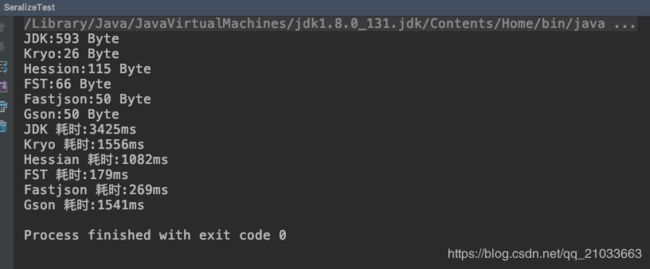java序列化框架码流、性能对比
本文对序列化框架:JDK、Kryo、Hession、FST、Fastjson、Gson进行对比,对比维度包括序列化后码流大小、10w次序列化反序列化性能耗时。
1、依赖jar包
<dependency>
<groupId>org.projectlombok</groupId>
<artifactId>lombok</artifactId>
<version>1.18.8</version>
<scope>provided</scope>
</dependency>
<!-- 序列化框架 -->
<dependency>
<groupId>hessian</groupId>
<artifactId>hessian</artifactId>
<version>3.0.1</version>
</dependency>
<dependency>
<groupId>io.protostuff</groupId>
<artifactId>protostuff-core</artifactId>
<version>1.6.0</version>
</dependency>
<dependency>
<groupId>io.protostuff</groupId>
<artifactId>protostuff-collectionschema</artifactId>
<version>1.6.0</version>
</dependency>
<dependency>
<groupId>io.protostuff</groupId>
<artifactId>protostuff-runtime</artifactId>
<version>1.6.0</version>
</dependency>
<dependency>
<groupId>io.protostuff</groupId>
<artifactId>protostuff-api</artifactId>
<version>1.6.0</version>
</dependency>
<dependency>
<groupId>com.esotericsoftware</groupId>
<artifactId>kryo</artifactId>
<version>4.0.0</version>
</dependency>
<dependency>
<groupId>de.ruedigermoeller</groupId>
<artifactId>fst</artifactId>
<version>2.57</version>
</dependency>
<dependency>
<groupId>com.google.code.gson</groupId>
<artifactId>gson</artifactId>
<version>2.8.5</version>
</dependency>
<dependency>
<groupId>com.alibaba</groupId>
<artifactId>fastjson</artifactId>
<version>1.2.62</version>
</dependency>
2、测试实体
package com.zhanghao.test.serialize;
import lombok.Getter;
import lombok.Setter;
import java.io.Serializable;
@Getter
@Setter
public class SerializeBO implements Serializable {
private static final long serialVersionUID = -3109861179106944873L;
private Integer a = 1;
private Long b = 2L;
private Byte c = 3;
private Short d = 4;
private Double e = 5.0;
private Float f = 6.0F;
private Boolean g = true;
// private Character h = 'h';
}
3、测试
package com.zhanghao.test.serialize;
import com.alibaba.fastjson.JSON;
import com.caucho.hessian.io.HessianInput;
import com.caucho.hessian.io.HessianOutput;
import com.esotericsoftware.kryo.Kryo;
import com.esotericsoftware.kryo.io.Input;
import com.esotericsoftware.kryo.io.Output;
import com.google.gson.Gson;
import org.nustaq.serialization.FSTConfiguration;
import java.io.ByteArrayInputStream;
import java.io.ByteArrayOutputStream;
import java.io.ObjectInputStream;
import java.io.ObjectOutputStream;
import java.util.ArrayList;
public class SeralizeTest {
private static FSTConfiguration configuration = FSTConfiguration.createDefaultConfiguration();
public static void main(String[] args) throws Exception {
SerializeBO serializeBO = new SerializeBO();
System.out.println("JDK:" + countJdkByte(serializeBO) + " Byte");
System.out.println("Kryo:" + countKryo(serializeBO) + " Byte");
System.out.println("Hession:" + countHessian(serializeBO) + " Byte");
System.out.println("FST:" + countFST(serializeBO) + " Byte");
System.out.println("Fastjson:" + countFastjson(serializeBO) + " Byte");
System.out.println("Gson:" + countGson(serializeBO) + " Byte");
long jdkTime = System.currentTimeMillis();
for (int i=0; i<100000; i++) {
byte[] bytes = seralizeJdkByte(serializeBO);
unSeralizeJdkByte(bytes);
}
System.out.println("JDK 耗时:" + (System.currentTimeMillis() - jdkTime) + "ms");
long kyroTime = System.currentTimeMillis();
for (int i=0; i<100000; i++) {
byte[] bytes = serializeKryo(serializeBO);
unSerializeKryo(bytes);
}
System.out.println("Kryo 耗时:" + (System.currentTimeMillis() - kyroTime) + "ms");
long hessionTime = System.currentTimeMillis();
for (int i=0; i<100000; i++) {
byte[] bytes = serializeHessian(serializeBO);
unSerializeHessian(bytes);
}
System.out.println("Hessian 耗时:" + (System.currentTimeMillis() - hessionTime) + "ms");
long fstTime = System.currentTimeMillis();
for (int i=0; i<100000; i++) {
byte[] bytes = serializeFST(serializeBO);
unSerializeFST(bytes);
}
System.out.println("FST 耗时:" + (System.currentTimeMillis() - fstTime) + "ms");
long fastjsonTime = System.currentTimeMillis();
for (int i=0; i<100000; i++) {
String str = serializeFastjson(serializeBO);
unSerializeFastjson(str);
}
System.out.println("Fastjson 耗时:" + (System.currentTimeMillis() - fastjsonTime) + "ms");
long gsonTime = System.currentTimeMillis();
for (int i=0; i<100000; i++) {
String str = serializeGson(serializeBO);
unSerializeGson(str);
}
System.out.println("Gson 耗时:" + (System.currentTimeMillis() - gsonTime) + "ms");
}
/** JDK */
private static int countJdkByte(Object obj) throws Exception {
ByteArrayOutputStream baos = new ByteArrayOutputStream();
ObjectOutputStream os = new ObjectOutputStream(baos);
os.writeObject(obj);
int count = baos.toByteArray().length;
os.close();
baos.close();
return count;
}
private static byte[] seralizeJdkByte(Object obj) throws Exception {
byte[] bytes = null;
ByteArrayOutputStream baos = new ByteArrayOutputStream();
ObjectOutputStream os = new ObjectOutputStream(baos);
os.writeObject(obj);
bytes = baos.toByteArray();
os.close();
baos.close();
return bytes;
}
private static Object unSeralizeJdkByte(byte[] bytes) throws Exception {
ObjectInputStream oit = new ObjectInputStream(new ByteArrayInputStream(bytes));
Object object = oit.readObject();
oit.close();
return object;
}
/** Kryo */
private static int countKryo(Object obj) {
Kryo kryo = new Kryo();
kryo.setReferences(true);
Output oOutput = new Output(1, 102400);
kryo.writeObject(oOutput, obj);
byte[] buff = oOutput.toBytes();
oOutput.close();
return buff.length;
}
private static byte[] serializeKryo(Object obj) {
Kryo kryo = new Kryo();
kryo.setReferences(true);
Output oOutput = new Output(1, 102400);
kryo.writeObject(oOutput, obj);
oOutput.close();
return oOutput.toBytes();
}
private static Object unSerializeKryo(byte[] bytes) {
Kryo kryo = new Kryo();
Input input = new Input(bytes);
Object obj = kryo.readObject(input, ArrayList.class);
input.close();
return obj;
}
/** Hessian */
private static int countHessian(Object obj) throws Exception {
ByteArrayOutputStream os = new ByteArrayOutputStream();
HessianOutput ho = new HessianOutput(os);
ho.writeObject(obj);
byte[] buffer = os.toByteArray();
os.close();
return buffer.length;
}
private static byte[] serializeHessian(Object obj) throws Exception {
ByteArrayOutputStream os = new ByteArrayOutputStream();
HessianOutput ho = new HessianOutput(os);
ho.writeObject(obj);
os.close();
return os.toByteArray();
}
private static Object unSerializeHessian(byte[] bytes) throws Exception {
ByteArrayInputStream is = new ByteArrayInputStream(bytes);
HessianInput hi = new HessianInput(is);
Object obj = hi.readObject();
is.close();
return obj;
}
/** FST */
private static int countFST(Object obj) throws Exception {
return configuration.asByteArray(obj).length;
}
private static byte[] serializeFST(Object obj) throws Exception {
return configuration.asByteArray(obj);
}
private static Object unSerializeFST(byte[] bytes) throws Exception {
return configuration.asObject(bytes);
}
/** Fastjson */
private static int countFastjson(Object obj) {
String jsonStr = JSON.toJSONString(obj);
return jsonStr.getBytes().length;
}
private static String serializeFastjson(Object obj) {
return JSON.toJSONString(obj);
}
private static Object unSerializeFastjson(String str) {
return JSON.parseObject(str, Object.class);
}
/** Gson */
private static int countGson(Object obj) throws Exception {
Gson gson = new Gson();
return gson.toJson(obj).getBytes().length;
}
private static String serializeGson(Object obj) throws Exception {
Gson gson = new Gson();
return gson.toJson(obj);
}
private static Object unSerializeGson(String json) throws Exception {
Gson gson = new Gson();
return gson.fromJson(json, Object.class);
}
}
如需使用 码流小、性能高的序列化框架,可采用Google出品的Protobuf数据协议 https://blog.csdn.net/qq_21033663/article/details/106171711
